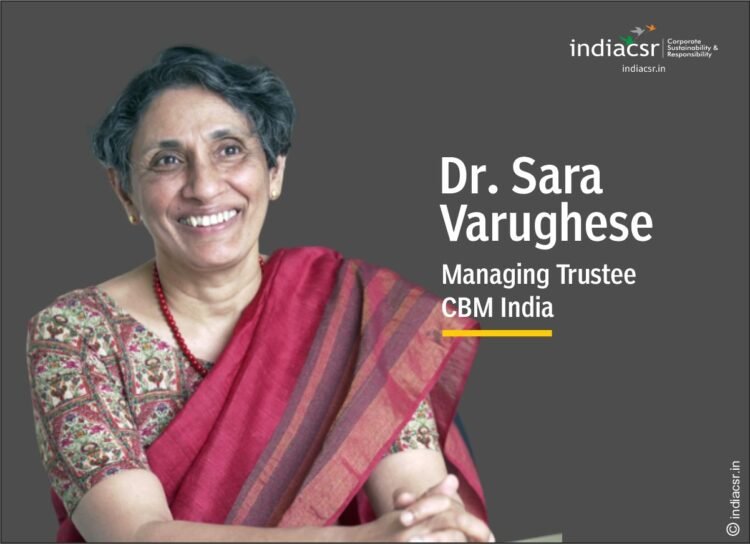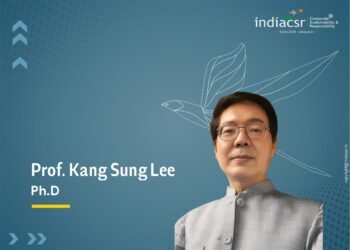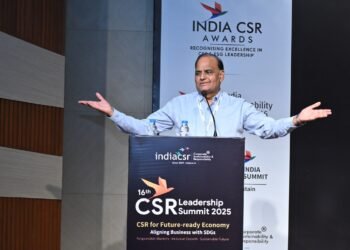Welcome to this inspiring edition of India CSR. Today, we have an extraordinary guest with us – Dr. Sara Varughese, the Managing Trustee of CBM India. As a pioneer in advocacy for the rights of people with disabilities, Dr. Varughese has spent her career committed to fostering inclusivity, equality, and access to services for marginalized communities.
CBM India, under her capable leadership, has worked relentlessly towards disability inclusion in various facets of society and development, shaping a vision where people with disabilities can exercise their rights, enjoy equal opportunities, and participate fully in all aspects of life. Today, we’re excited to have Dr. Varughese share her insights, experiences, and vision, providing us with a deeper understanding of her work in this field.
Join us as we explore her journey, discuss the challenges that individuals with disabilities face in India, and learn about the innovative strategies that CBM India employs to transform lives. This is a conversation that promises to challenge your perspectives, inspire you to action, and open your eyes to the incredible potential that lies within every individual, regardless of their physical condition. Stay with us as we dive into this enlightening conversation with Dr. Sara Varughese.
Q1. Can you tell us about the inception, milestones, and journey of CBM India and what inspired its establishment?
CBM India Trust is a non-profit organization dedicated to improving the lives of individuals with disabilities in India. The journey of CBM International began back in 1908 when the visionary German pastor Ernst Jakob Christoffel laid its foundation. Fast forward to 1967, CBM ventured into India as the CBM Liaison Office, focusing on education initiatives for visually impaired children. In 1994, the Trust became an independent legal entity, marking a significant milestone in its evolution.
Throughout its remarkable history, CBM India has achieved numerous noteworthy accomplishments. It all began in 1967 when CBM took the initiative to provide education, rehabilitation, and eye care services. This endeavour laid the groundwork for the comprehensive ophthalmic health program in Tiruchirappalli in 1975, which eventually expanded to encompass community ophthalmology services in CBM-supported hospitals across South and North India.
In 1999, CBM India proudly joined forces with other founding members to launch “Vision 2020 – The Right to Sight,” an ambitious initiative aimed at eradicating avoidable blindness. In recognition of its exceptional efforts, the Indian government acknowledged CBM India in 2004 for its outstanding contribution to the elimination of avoidable blindness in the country.
CBM India’s achievements extend beyond the realm of eye care. In 2016, the organization earned empanelment with the Government of India for the Access India Campaign, a testament to its commitment to social justice and empowerment. Additionally, CBM India introduced “Assessment For All” in 2019, an inclusive assessment tool designed to evaluate literacy and numeracy levels, including those of learners with disabilities.
The year 2020 marked a significant milestone as CBM India collaborated with the state governments of Karnataka, Haryana, and Sikkim to integrate eye care services into Primary Health Centers (PHCs), thereby ensuring accessibility for all. In 2021, CBM India partnered with Regional Institutes of Ophthalmology (RIO) to integrate low vision and rehabilitation services within the government health system, benefitting nine RIOs.
Since 2020, CBM India has been working closely with the Sikkim State Health Department and Siliguri Greater Lions Eye Hospital to make Sikkim the first state in India to be free of avoidable blindness.
We firmly believe that every individual, regardless of disability, deserves to live a life filled with dignity and independence. We actively engage with persons with disabilities, marginalized populations, and partner organizations to break down barriers hindering their full and equal participation in society. Through our collaborative efforts, policy influence at all levels, and inclusive response to emergencies and natural disasters, we strive to create a world where everyone can thrive without limitations.
Q2. The World Health Organization estimates that over 15% of the global population lives with some form of disability. What is the significance of disability-inclusive development in the Indian context, and what is CBM India doing to promote it?
Disability-inclusive development holds immense importance in the Indian context as it acknowledges and upholds the rights of individuals with disabilities to fully participate in society and have equal opportunities. We recognize that people with disabilities encounter unique obstacles when it comes to accessing essential services like healthcare, education, and employment, among others. At CBM India, we actively work to address these barriers and raise awareness about disability and inclusion across all our endeavours. We strongly advocate for the inclusion of people with disabilities in policy-making and decision-making processes at various levels, be it local or national.
Through our Community-Based Inclusive Development (CBID) programs, we ensure that individuals with disabilities have access to the same opportunities and services enjoyed by other members of their communities. This includes crucial aspects like healthcare services, educational and livelihood opportunities, accessible environments and transportation, and access to government schemes. Our initiatives are designed to empower individuals with disabilities and enable their active participation in society.
To promote disability-inclusive development, CBM India has undertaken a range of specific initiatives. We provide comprehensive healthcare services that focus on preventing, treating, and rehabilitating disabilities while also working towards reducing the prevalence of diseases that lead to impairments. In the realm of education, we support the enrollment and retention of children with disabilities in inclusive classrooms, providing necessary support to teachers as required.
Moreover, we actively support livelihood opportunities for people with disabilities through vocational training, entrepreneurship development, and inclusive employment programs. By creating disability-friendly infrastructure and services, providing assistive devices, and offering rehabilitation services, we strive to ensure that individuals with disabilities can lead independent and fulfilling lives. Additionally, we are committed to promoting inclusive humanitarian responses and disaster risk reduction training, recognizing the specific needs and vulnerabilities of people with disabilities in times of crisis.
Overall, our aim is to foster an inclusive society where individuals with disabilities are valued and can actively contribute. By promoting disability-inclusive development, we are not only transforming lives but also shaping a more equitable and empathetic future for all.
Q3. Could you share with us some of the significant partnerships that CBM India has forged to build an inclusive India for disabled people, and what has been their impact?
CBM India has formed several impactful partnerships to create an inclusive India for persons with disabilities. One of our noteworthy collaborations is with Fullerton, where we have integrated inclusive vision centers into Primary Health Centers. This collaboration extends further to the Regional Institute of Ophthalmology in Bangalore and Rohtak. Through this partnership, we have been able to conduct screenings for a staggering total of 25,029 individuals, identifying 10,956 people with refractive errors and referring 1,084 individuals for cataract surgeries between 2021 and 2023. This initiative has also directly impacted 131 persons with disabilities, ensuring that their specific needs are met.
In addition, CBM India partnered with the Cognizant Foundation for an Inclusive Vaccination Drive in 2021-22. This drive has benefited an impressive number of 14,052 individuals, including 9,769 persons with disabilities and their caregivers. The impact of this collaboration was truly felt, with 8,274 individuals vaccinated in Doddaballapura district, Bengaluru, and 5,778 individuals vaccinated in Kolkata. We went the extra mile to ensure that even persons with severe disabilities received the necessary vaccinations in the comfort of their own homes in Doddaballapura, reaching a thousand individuals in need.
Furthermore, the Bahuddeshy Viklang Jan Foundation (BVJF), which was formally registered in 2019, stands as a significant initiative for CBM India. This foundation aims to empower persons with disabilities, as well as the Organisation of Persons with Disabilities (OPDs) across India. Through this, we have been able to strengthen our efforts and expand our reach, working towards a more inclusive society for all.
From the early days of our work, CBM India has been involved in supporting major eye care institutions, rehabilitation centers, universities, colleges, schools, training centers, and grassroots institutions. These collaborations have played a pivotal role in building the necessary human resources and expertise for disability inclusion. By investing in these partnerships, we have been able to lay a solid foundation for our work and ensure that our efforts have a lasting impact on the lives of individuals with disabilities.
Overall, these partnerships have been instrumental in our journey towards building an inclusive India. They have allowed us to reach a larger number of people, address specific needs, and create a more supportive environment for persons with disabilities. We are immensely grateful for these collaborations, as they have been vital in our mission to create a society that embraces and empowers everyone, regardless of their abilities.
Q4. Can you share some beneficiary stories that highlight the impact of CBM India’s work in empowering disabled people and promoting their inclusion in society?
We feel fortunate to be a part of the change and witness the change from the narrative of disability as a taboo to disability as a strength.
This is epitomized in one of our success stories of Shobha, a daily wage labourer turned entrepreneur. Shoba beat the odds, despite her hearing disability and speech impediment. She was let go from her job because of her inability to work on par with her peers, which led to financial distress. Via Project Jaagruti, an initiative by CBM India, Shobha received training and financial support to start small-scale enterprises, which paved the path to a thriving dairy business she runs today alongside her mother-in-law.
Another heroic entrepreneurial story is of Sunaina, who, despite her visual impairment, managed to start her successful apiary business with the help of CBM’s Atmanirbhar Shamoodhay project. Today, Sunaina is a trainer at Atmanirbhar Shamoodhay Project, inspiring other girls to give flight to their dreams.
In addition to ensuring freedom for people with disabilities, one of our major motives is to create inclusivity for the affected population.
One of our proud moments was when 7-year-old Tanvi, a child with Cerebral Palsy Spastic Diplegia who could only communicate with disyllabic words in Kannada, managed to communicate more effectively. CBM India’s Inclusive Community Learning Centre (ICLC) offered her the space to learn, practice, and improve her skills through various physical, speech, occupational, and psychological therapies. These interactions helped Tanvi improve her abilities, build self-confidence, and enhance her communication and problem-solving skills.
Q5. What are the goals and future plans of CBM India, and how do you see the organization contributing to the overall development of India’s disabled population?
India has an estimated population of 21 million persons with disabilities. CBM India presently reaches approximately 1.5 million people annually who have disabilities or are at risk of developing them. Our objective is to expand our outreach and support more people with disabilities to become active, contributing members of their communities. A society that includes persons with disabilities is a society where every person has the opportunity to reach their full potential.
We do this through our strategic goals and thematic initiatives:
- Strengthen the voice and autonomy of people with disabilities.
- Build inclusive and sustainable local and national systems and services.
- Build inclusive, resilient communities with equal opportunities for economic empowerment, education, and health for persons with disabilities.
- Ensure that populations affected by disasters have access to inclusive humanitarian assistance and protection.
- Minimise the conditions which lead to disability and reduce the prevalence of diseases which cause impairments.
Our thematic initiatives include inclusive livelihoods, inclusive health, inclusive education, and inclusive humanitarian action for people with disabilities and other disadvantaged groups.
Q6. In your view, what is the current scenario for disabled people in India, and what opportunities do you see for them in the future?
In India, we have an estimated 1.8-2.2% of the population living with disabilities, and they encounter unique challenges in accessing education, employment, and healthcare. As our country’s population ages and the prevalence of chronic conditions increases, it is expected that this number will continue to rise. While some initiatives have been taken to foster inclusivity, there is still much work to be done to ensure accessibility in public spaces, raise awareness about disability issues, and enhance inclusive education.
However, amidst these challenges, there are also promising opportunities for persons with disabilities in India. Technological advancements are opening new doors, enabling greater accessibility and independence. Additionally, there is a growing recognition of the value and potential that individuals with disabilities bring to the workforce. We believe in harnessing these opportunities and empowering individuals with disabilities to thrive in their professional lives.
To facilitate this, we are currently developing a dynamic platform designed to educate entry- and mid-level employees about disability inclusion in the workplace. This initiative aims to create meaningful attitudinal and behavioral changes in employees, fostering a culture of respect and understanding when interacting with persons with disabilities. By equipping employees with the knowledge and skills necessary to embrace diversity, we can foster an inclusive and supportive work environment where everyone can contribute their unique talents and perspectives.
We are committed to driving positive change and dismantling barriers that hinder the full participation of persons with disabilities. Through innovative initiatives like our upcoming educational product, we are actively working towards building a more inclusive society where everyone, regardless of ability, can thrive and fulfill their potential.
Q7. Finally, could you offer some insights into the work that needs to be done to promote disability-inclusive development in India and how the government, civil society, and private sector can collaborate to make it happen?
To secure a sustainable future, businesses must embrace a transformative approach to their CSR initiatives. It’s all about taking bold and ambitious steps throughout their operations and value chains to create a positive impact on people, communities, and markets. We believe in the power of collaboration with government and corporate partners to drive inclusion and sustainability. While some companies solely focus on meeting external standards for risk management, we advocate for “visionary sustainability strategies” that integrate sustainability into every aspect of their business. By aligning these strategies with shared goals like market growth and social inclusion, businesses can create a lasting and meaningful impact. Let’s work together to shape a future where sustainability thrives, and everyone benefits.
- To be attributed to Dr. Sara Varughese Managing Trustee of CBM India
Also Read:
- CBM India launches a co-operative to empower women and people with disabilities in Maharashtra
- Eyeing a Visionary Future: NGOs and Eye Hospitals Collaborate for Universal Eye Health Coverage in Karnataka
- UN Announces SEED Award Winners 2011 With Focus on African Entrepreneurs






















